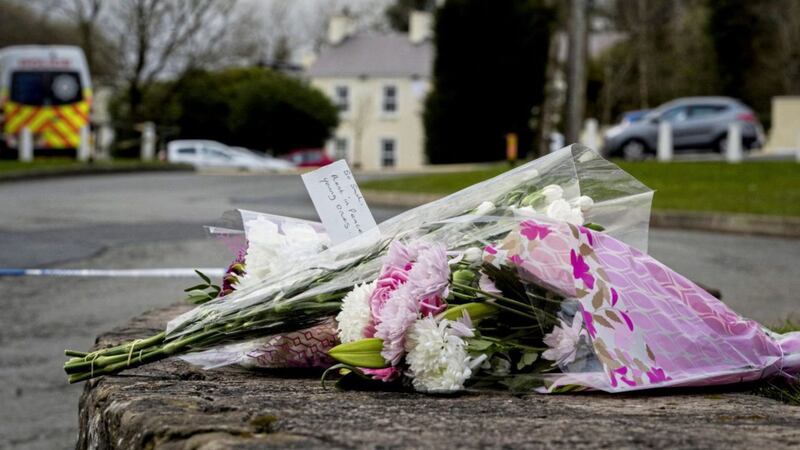Lough Neagh was dark and ruffled on Sunday afternoon. Gun grey and heavy brown, with unsettled thatches of blackened water.
Backed against the warm stone in the sheltered sunlight of the ancient Cranfield church where my parents’ remains are resting, I couldn’t see the water’s mood lifting despite the brightness of St Patrick’s Day.
There’s times when the lough seems to have a connection with the soul of the people. And its mood has had no reason to lighten in the last few days. So much grief across the north. So much heartache.
On Sunday evening, after a wonderful day with favourite people, three of us sat late-on sorting the world to rights. Speeding blue lights blinked briefly against the closed blinds. Emergency services on their way to a tragedy.
I did what I do every night before bedtime. I called both my daughters for a few minutes of chat but really just for three words of meaning – I love you. I’m incredibly lucky. I know that. It is one of the greatest and simplest gifts that I receive every day. And my gratitude is boundless for the preciousness of those words from those voices.
Wakening up on Monday morning to horrendous news of deaths from Antrim to Louth, from Derry to Tyrone, it was hard to even begin quantifying the sudden onslaught of grief and disbelief and anger and shock and helplessness that has battered so many people this week.
I opened The Irish News and scanned through the death notices, spotting names I know on the page - a connection’s connection, taken by illness. A different type of tragedy; no less tragic.
These moments sometimes come along in our lives. They seem so incomprehensible, so unbelievably unfair and unjust. Each person, at every age, in every circumstance, with so much more greatness still to give the rest of us. Stolen away.
Yet – without directly knowing anyone deceased in recent days – I know with certainty that communities in townlands and city streets across the north have been surrounding those who are grieving and swelling their homes with an overwhelming goodness that will resonate forever in collective memory. It’s what we do. It’s who we are.
When tragedy strikes some down, love rises around those left behind. It doesn’t change the terrible facts of loss; nothing can undo that pain. But the support ultimately scaffolds the sadness, even if it’s unseen in the blur of immediate grief.
It says to those bereaved that they are not alone. It speaks to the love that is felt for those who have passed; but also to the love that the deceased created for others during their lifetimes, long or short, older or younger.
As Monday afternoon became Monday evening, more connections of connections filtered through: GAA clubrooms opening for support, or being closed for respect. Community at its truest. Solidarity against suffering.
John O’Donohue wrote: “People who are sent to the dark ground of suffering know how all the normal certainties collapse…. Pain breaks your innocence. It shatters your trust in the world you knew…. Suffering seems to be a frightening totality. When it comes, it puts you in the place of unknowing.”
That fear of ‘unknowing’ and the sorrow of shattered innocence is a visitor to homes across this land everyday, every hour, as people pass away. But the suffering has been particularly cruel in recent days.
Down the decades, like most others, I’ve had to learn to come to terms with the sudden deaths of loved ones and the lengthy demise of others.
The only thing upon which I can constantly stand firm is the deepest of gratitude for the privileged brilliance of knowing and loving those who are gone – however much time I got to spend with them. But that enlightenment only came after blessing myself with the right to grieve for many years. And to weep. Sometimes endlessly. And to feel angry, and hurt, and outraged at the unfairness of it all.
These aftermaths – moments like today - are the times when grief and mourning and heartache need to be respected, and given their space and their rights as rites.
In the wake houses and the funeral masses, at the gravesides and the firesides, on the mantlepieces and the bedroom lockers, the memories of our loved ones never die. They just wait. And they will keep waiting for us. Until a new dawn light slowly begins to fall across the broken hearts of those left behind, and dries the tears of today with the promise that tomorrow’s memories will renew the wonder of yesterday’s love. And they will.
Twitter: @jarlathkearney
Facebook: Jarlath Kearney








